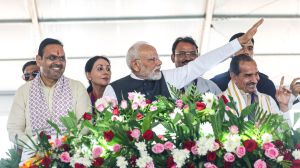Nepal Army to step up offensive
Five days after Nepal’s king seized power, arrested government leaders and suspended civil liberties, the Army vowed on Friday to make ...

Five days after Nepal’s king seized power, arrested government leaders and suspended civil liberties, the Army vowed on Friday to make a decisive strike against Maoist rebels to end a revolt to overthrow the monarchy.
With protests banned, politicians isolated and under house arrest and the media muzzled, the Army will now focus all its resources on forcing the rebels back to the peace table, generals said, setting the scene for rising violence.
‘‘The Army must launch tougher action against the Maoists if they ignore His Majesty’s call to lay down their arms, join the mainstream and if they continue their violence,’’ Army Chief General Pyar Jung Thapa said.
The Army’s chief spokesman, Brigadier-General Dipak Gurung, said ‘‘Maoist terrorism’’ posed the greatest threat to Nepal and urged allies to back Kathmandu’s war. ‘‘Now we can solely go after the Maoists in a single-minded manner without having to worry about what’s going to happen on the streets, people’s agitation,’’ he said. ‘‘We can solely direct our resources and energy towards them. Definitely, we can deal with the Maoists in a decisive manner. Our main aim will be to force them to come to talks or the political mainstream.’’
At least five rebels have been killed in separate clashes with soldiers since Tuesday. Guerrillas have also set off several bombs in the west, but no one was hurt, the Army said.
With phones and the internet cut under a state of emergency, Kathmandu has been free of major protests since the king sacked Prime Minister Sher Bahadur Deuba and took power.
But the Independent Human Rights Commission is investigating reports that soldiers in a helicopter fired on students protesting in the tourist town of Pokhara on Tuesday. Activists say at least two were killed and several wounded. ‘‘There are unconfirmed reports that some of them were taken in and that a few of them were tortured and even there were some bullet wounds,’’ said Rights Commission member Sushil Pyakurel.
Arrests of activists continued on Friday, political party members said. But there is no reliable information on how many have been jailed or put under house arrest. Many are on the run. In Geneva, the UN High Commissioner for Human Rights Louise Arbour on Friday denounced widespread arrests of political leaders and trade unionists in Nepal and called for an end to their ‘‘arbitrary detention’’.




- 01
- 02
- 03
- 04
- 05


























